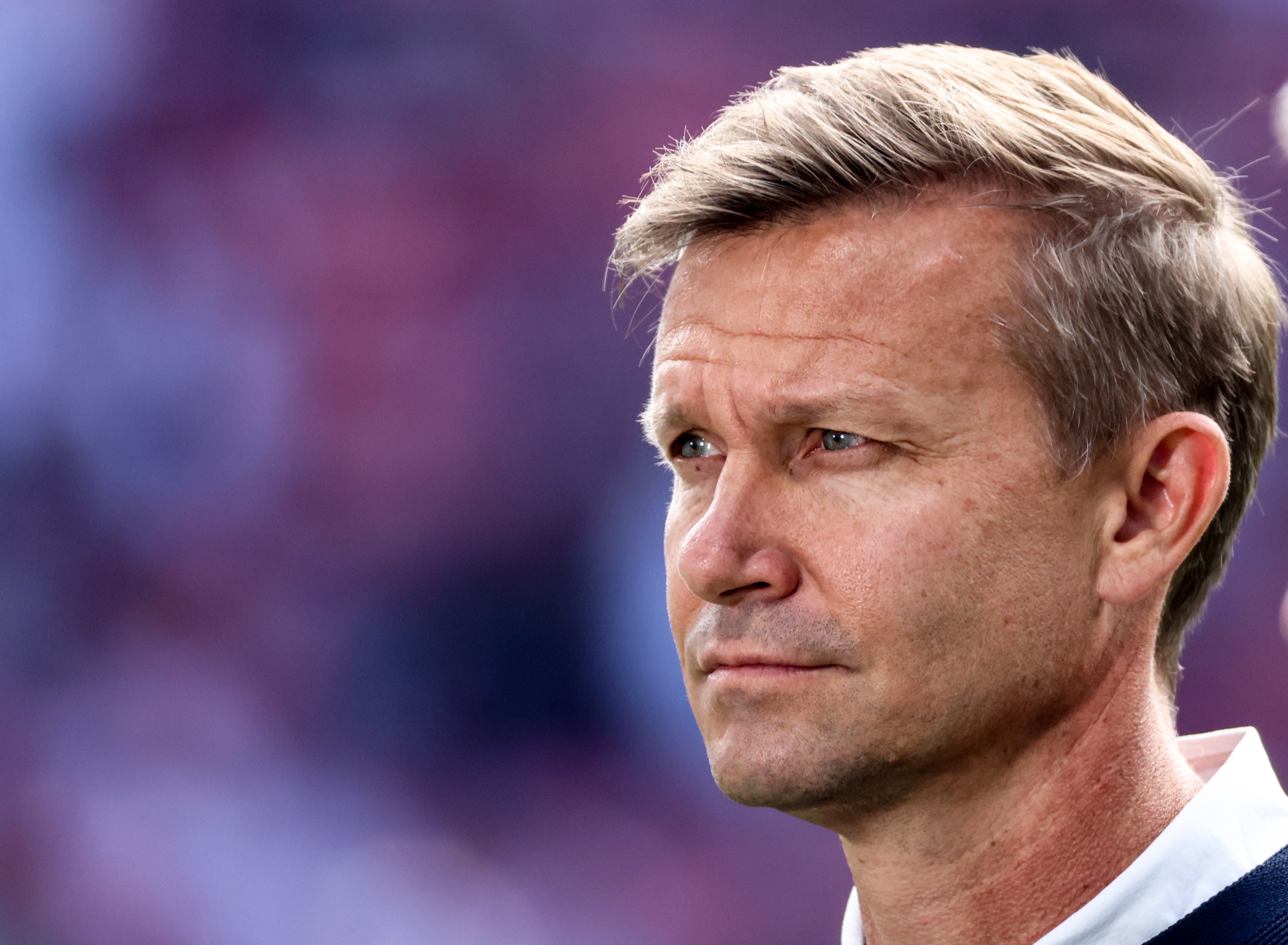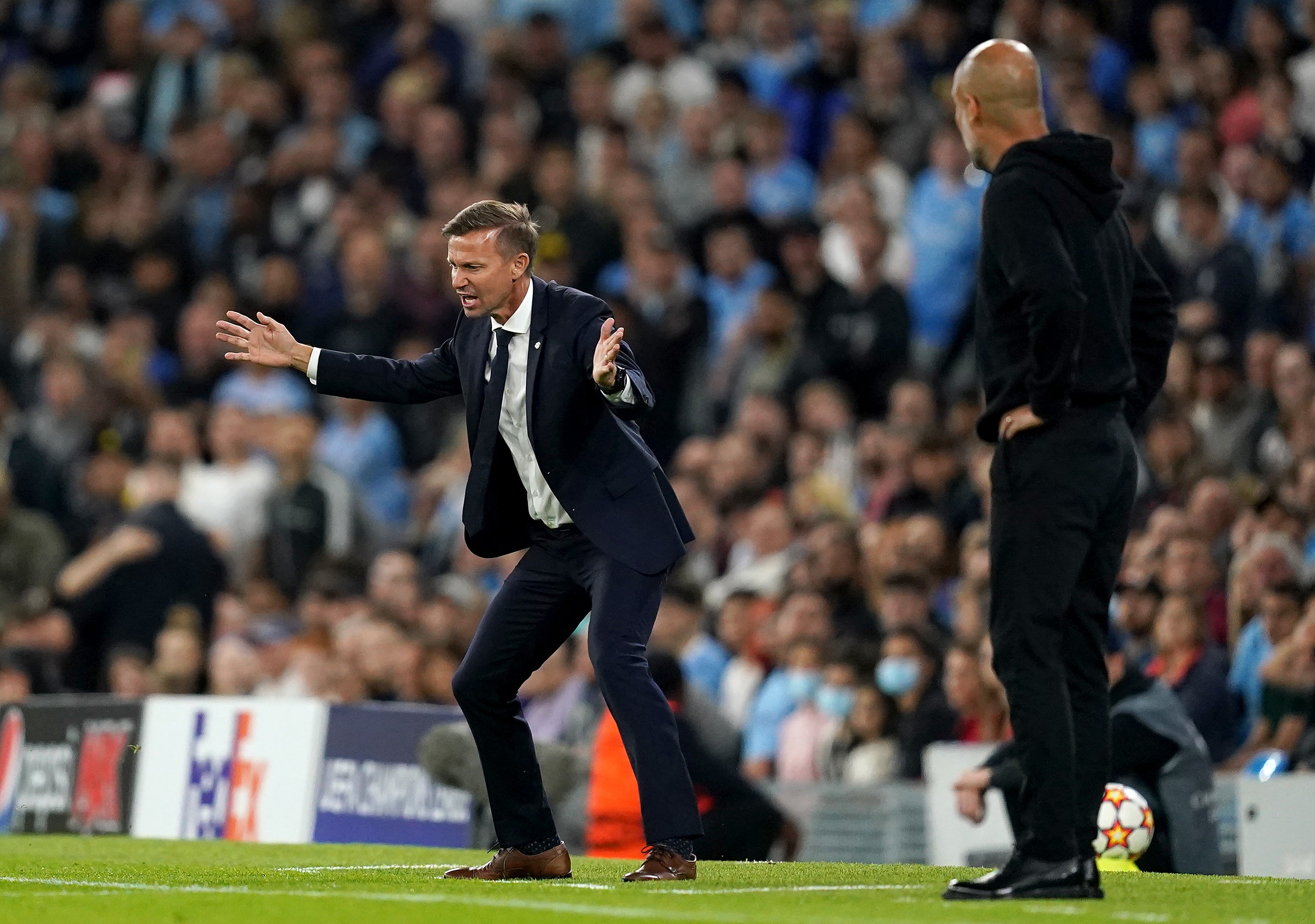Jesse Marsch faces tactical challenge and cultural shock as new manager of Leeds United
Following Bielsa will require unpicking a unique man-marking system ingrained over several years, but harder still will be shifting from a rising star of the cosy Red Bull family to manage Leeds

The last time Jesse Marsch replaced an idiosyncratic manager with a different tactical philosophy to his own, things didn’t go well. Marsch took over Julian Nagelsmann’s highly tuned RB Leipzig side last summer and tried to instil more speed and energy, to bring a little organised chaos, to transform them from designers into disruptors. But the American failed to unravel the possession-based habits of the players he inherited, and in early December, after six league defeats, he was gone.
Three months later he is the new manager of Leeds, where he takes over from one of the most distinctive coaches in the game. Marcelo Bielsa is often held up as an influencer of others but in reality he is unique in world football – no other coach of his reputation is dogmatically wedded to a man-marking system, and it is notable that his many admirers, who include Mauricio Pochettino and Pep Guardiola, do not copy it. Marsch inherits a Leeds squad which has been drilled to play in a very specific way for nearly four years. How easy will that be to untangle?
There are plenty of reasons for optimism. Kalvin Phillips’s outstanding performances in Euro 2020, for example, showed how intelligent footballers can quickly adapt to a different style of play. Although Marsch may not believe in all-out man-marking, his principal ideas broadly correlate with Bielsa’s style: a coordinated, aggressive press high up the pitch, an unrelenting work ethic instilled on the training ground and an instinct to play forwards whenever possible. Marsch’s methods worked to great effect at New York Red Bulls and then at Red Bull Salzburg, where he won back-to-back league and cup doubles with a team who swamped and stifled the opposition.
Bielsa’s lust for savagery on the training pitch, including brutal sessions of “murderball”, is certainly not about to be replaced by head tennis and crossbar challenges. As Shaun Wright-Phillips told BBC Sport of his time playing for Marsch in New York: “I had a fantastic time under him, but it was a change for me coming from England … I had never trained so hard before in my life. I was already fit but some of the training that he put on... The humidity in New York was 80 per cent I think, and on top of that heat his training sessions were hard.”
In modern managerial terms he is more from the Klopp mould than the school of Guardiola, more about hustling a mistake from the opposition than passing them into submission, more post-match hugs than rants. When The Independent interviewed Marsch in 2019 while at Salzburg, the Princeton graduate came across as intelligent, open, thoughtful and a compelling communicator, if occasionally a little Brent-ish in his management speak. A year earlier Marsch had worked as assistant under manager Ralf Rangnick where he honed his theories on speed and “verticality”, traits which Leeds felt suited Bielsa’s successor.

Like Bielsa, Marsch is known to do things a little differently. During his first preseason in Salzburg, he sat his players down and asked them directly what they wanted to change about the club and about training, and what they wanted to achieve. “A lot of those guys had been at this club for six or seven years and had never really been asked their opinion,” he told Grant Wahl. This sense of open collaboration is at the heart of his methods, from the pitch to his backroom staff and club hierarchy. As he explained to The Independent: “I am surrounded by people who are better at doing what they do than I am. That means I can focus my energies in the right places.”
It is a new outlook which may bring a much-needed freshness to Elland Road. Yet there is also something ill-fitting about Marsch in Leeds, and not because he is an American coach in the Premier League. Almost his entire managerial career to date has been at the services of the Red Bull football factory, a cosy system in which he has thrived learning from other coaches and enjoying a corporate culture of shared knowledge, talent and opportunity. They are mostly new clubs, too: the New York franchise is as young as Patrick Bamford; RB Leipzig was established in 2009. In this way, joining Leeds represents an even greater leap than Marsch’s move to Europe in 2018. He is taking on a cultural institution in Leeds United, helming a century-old club that carries an essential community function in a way that most of his previous teams did not.
Marsch has the emotional intelligence to understand the demands that will bring, and he knows the importance of understanding the place and people he adopts. While at Salzburg, an impressive dressing-room video of the manager shouting a fluid combination of hacked German and sweary English went viral. “There’s two things that come along with speaking German,” he later explained. “There’s an adaptation to the culture which includes you understanding how the people think and how they work, but then there’s also showing the vulnerability, the imperfection of who I am and what I do, and that’s a big part of how I coach.”
But connecting with the players is only one part: connecting with the club will be more important than ever before in Marsch’s career. Bigger than any tactical challenge will be embracing the football culture at Elland Road, and whether his brand of all-American optimism translates in West Yorkshire. Marsch might not be getting in pints at The Peacock before kick-off but he will endeavour to understand Leeds as best he can. Go well and he’ll be forever part of the tribe; go wrong and he’ll soon know about it.
Join our commenting forum
Join thought-provoking conversations, follow other Independent readers and see their replies
Comments
Bookmark popover
Removed from bookmarks